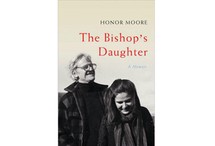The Bishop's Daughter
By Honor Moore
352 pages;
Norton
At the height of World War II, a young Marine, scion of an aristocratic New England family, took a bullet in the chest. It pierced his lung, an inch from his fiercely beating heart, and shot straight out his back. But that searing wound was nothing compared with the violent apprehension of holiness that broke Paul Moore open, like Saint Paul on the road to Damascus, on the cusp of his 17th birthday, a conversion that later propelled him into the arms of his church. Mentored by progressive theologians Paul Tillich and Reinhold Niebuhr, as well as social activist Dorothy Day, Moore backed away from his gilded pedigree—the "creamy" mansion by the sea, the Stanford White house in Manhattan, the fairy-tale country home with its cherished family heirlooms—to become a champion of the poor, a civil rights crusader during the Johnson era, and ultimately Episcopal bishop of New York. But the life of this charismatic reformer was also a reliquary of secrets, which his eldest daughter, poet and biographer Honor Moore, opens up with grace and urgency in her memoir, The Bishop's Daughter (Norton). For years Paul Moore hid his homosexual affairs from his beautiful, unbalanced wife, Jenny, and their nine children. It is the collateral damage of that lie, along with "the enchantment of my father's priesthood"—its impact on her own political, spiritual, and sexual identity during a time of upheaval in American politics and culture—that Honor explores in prose as emotionally resonant as confession. It's brave to open up old wounds; braver still to help them heal.
— Cathleen Medwick


